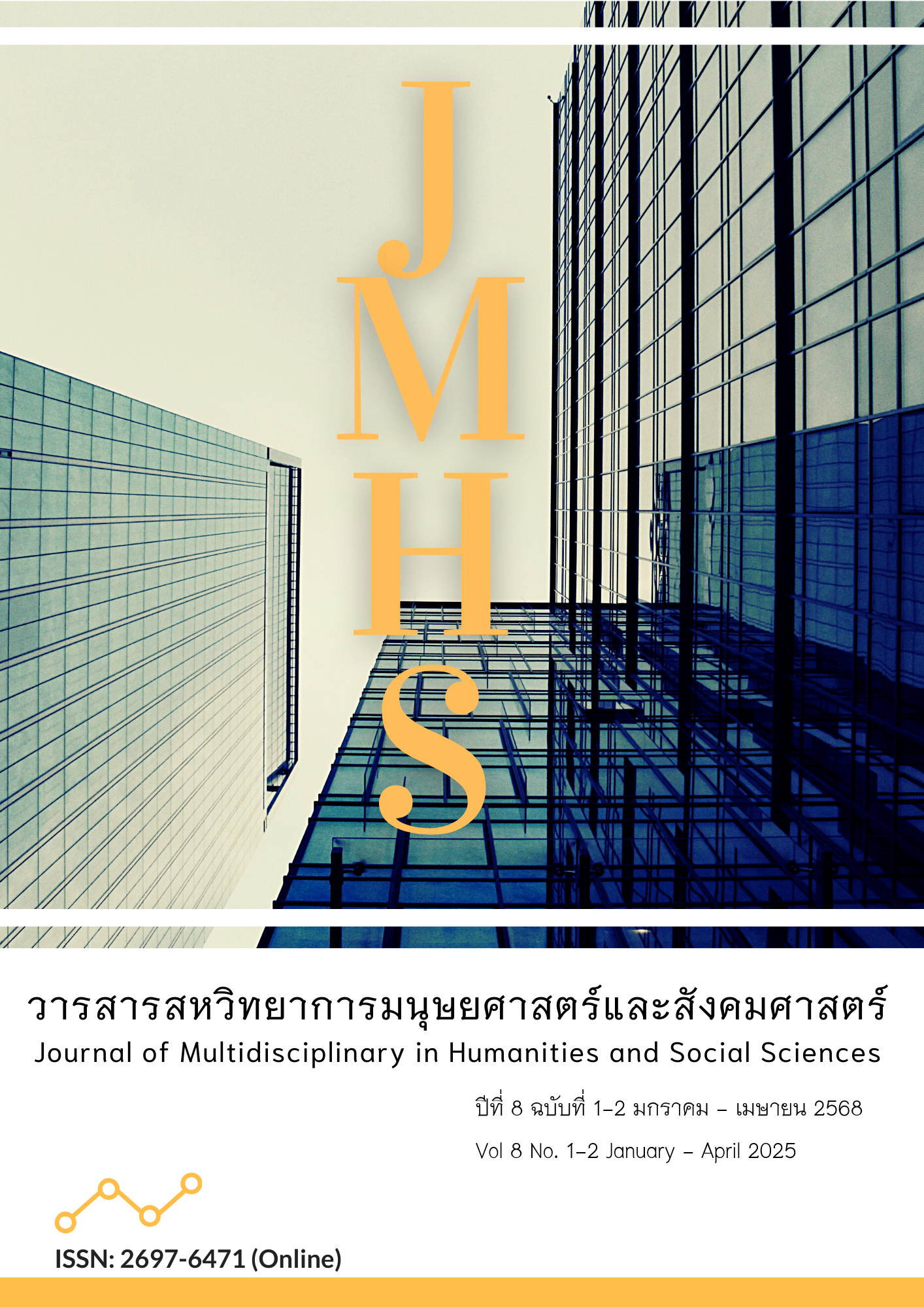Administrators’ Skills Affecting Learning Management of Teacher in Digital Era Under Nakhon Phanom Primary Educational Service Area Office 1
Main Article Content
Abstract
The rapid changes in the world caused by advanced and modern technology require teachers to develop learning management that can develop learners to their fullest potential. The purposes of this research were to (1) study and compare the administrators’ skills; (2) study and compare the learning management of teachers in the digital era; (3) study the relationship between the administrators’ skills and the learning management of teachers in the digital era; and (4) study the predictive power of the administrators’ skills affecting the learning management of teachers in the digital era under Nakhon Phanom Primary Educational Service Area Office 1. The samples consisted of 319 school administrators and teachers who followed the percent criterion in the sample size specification, selected by stratified random sampling. The instruments used were two aspects of five-rating scale questionnaires: (1) a questionnaire on the administrators’ skills, and (2) a questionnaire on the learning management of teachers in the digital era. The statistics employed were percentage, mean, standard deviation, t-test (Independent samples), one-way analysis of variance, Pearson's correlation coefficient, and multiple regression stepwise analysis.
The results revealed that 1. the overall administrators’ skills were at the high level. In comparison, the overall administrators’ skills classified by status and classified by school size revealed non-significant differences. 2. The overall learning management of teachers in the digital era was at a high level. In comparison, the overall learning management of teachers classified by status revealed non-significant differences, while the results revealed that there was a statistically significant difference at the .01 level. 3. The administrators’ skills and the learning management of teachers in the digital era revealed quite a high significant positive correlation at the .01 level. 4. There were four variables in administrators’ skills that affected the learning management of teachers in the digital era. They could be predicted up to 53 percent. This research can use the data obtained as a guideline for developing the skills of administrators and can use the data obtained as a guideline for developing the learning management of teachers in the digital age to be efficient and effective.
Article Details

This work is licensed under a Creative Commons Attribution-NonCommercial-NoDerivatives 4.0 International License.
Views and opinions appearing in the Journal it is the responsibility of the author of the article, and does not constitute the view and responsibility of the editorial team.
References
ขนิษฐา ตั้งวรสิทธิชัย. (2563). สมศ. แนะ 4 ทักษะครูยุคใหม่ เก่งเทคโนโลยี-สร้างทักษะชีวิต. สืบค้นจาก https://www.prachachat.net/education/news-413725
จิติมา วรรณศรี. (2564) การบริหารการจัดการศึกษายุคดิจิทัล. พิษณุโลก: รัตนสุวรรณการพิมพ์.
ชานนท์ คำปิวทา, สถิรพร เชาวน์ชัย, วิทยา จันทร์ศิลา และฉลอง ชาตรูปะชีวิน. (2565). การวิเคราะห์องค์ประกอบความสามารถในการจัดการเรียนรู้ในยุคดิจิทัลของครูโรงเรียนมัธยมศึกษา สังกัดสำนักงานคณะกรรมการการศึกษาขั้นพื้นฐาน, วารสาร มจร สังคมศาสตร์ปริทรรศน์, 12(5), 139-151. สืบค้นจาก https://so03.tci-thaijo.org/index.php/jssr/article/view/258984
ชัยยนต์ เพาพาน. (2559). แนวคิดและทฤษฎีพื้นฐานการเป็นผู้นำของผู้บริหารสถานศึกษาในศตวรรษที่ 21. วารสารบริหารการศึกษา มหาวิทยาลัยขอนแก่น, 12(1), 1-9. สืบค้นจาก https://so02.tci-thaijo.org/index.php/EDMKKU/article/view/56340
ไชยา ภาวะบุตร. (2560). ภาวะผู้นำทางวิชาการ Academic Leadership ฉบับปรับปรุง พ.ศ. 2560. สกลนคร. มหาวิทยาลัยราชภัฏสกลนคร.
ทิพย์วิมล วังแก้วหิรัญ และ ศิรินทร มีขอบทอง. (2565). การพัฒนาทักษะที่จำเป็นของครู ไทยในยุคดิจิทัล. กรุงเทพฯ. สำนักงานเลขาธิการคุรุสภา.
นพพงษ์ บุญจิตราดุลย. (2557). หลักการและทฤษฎีการบริหารการศึกษา. นนทบุรี: ตีรณสาร.
ปรัชญา สังชาตรี, ทัศนา ประสานตรี และ สุมาลี ศรีพุทธรินทร์. (2566). ทักษะการบริหารของผู้บริหารสถานศึกษาที่ส่งผลต่อการจัดการเรียนการสอนภายใต้สถานการณ์การแพร่ระบาดของเชื้อไวรัสโคโรนา (COVID-19) สังกัดสำนักงานเขตพื้นที่การศึกษาประถมศึกษาสกลนคร เขต 3. วารสารพุทธศาสตร์ มจร.อุบลราชธานี, 5(1), 19-30.
พิมลพรรณ เพชรสมบัติ. (2560). ทักษะการบริหารงานของผู้บริหารในสถาบันอุดมศึกษา. วารสาร มจร. การพัฒนาสังคม, 3(2), 32-43. สืบค้นจาก
http://ojs.mcu.ac.th/index.php/socdev/article/view/4279
แพรดาว สนองผัน. (2557). ทักษะของผู้บริหารสถานศึกษาในศตวรรษที่ 21 สังกัดสำนักงานเขตพื้นที่การศึกษาประถมศึกษาอุดรธานี เขต 3. วารสารศึกษาศาสตร์ มหาวิทยาลัยขอนแก่น, 37(4), 42-50. สืบค้นจาก https://so02.tci-thaijo.org/index.php/EDKKUJ/article/view/49167
มัตติกา ผาลี, ไชยา ภาวะบุตร และ จินดา ลาโพธิ์. (2566). รูปแบบการพัฒนาภาวะผู้นำครูยุคดิจิทัลในการจัดการเรียนรู้ของโรงเรียนประถมศึกษา ในเขตพื้นที่รับผิดชอบสำนักงานศึกษาธิการ ภาค 11. วารสารสังคมศาสตร์และวัฒนธรรม, 7(5), 146-162. สืบค้นจาก https://so06.tci-thaijo.org/index.php/JSC/article/download/264153/177282
รัตนา แปโค, จินดา ลาโพธิ์, ชรินดา พิมพบุตร และ วีรวัฒน์ คำแสนพันธ์. (2567). ภาวะผู้นำเชิงสร้างสรรค์ของผู้บริหารสถานศึกษาที่ส่งผลต่อประสิทธิผลการจัดการเรียนรู้ของครู ในยุคดิจิทัล โรงเรียนสังกัดสำนักงานเขตพื้นที่การศึกษาประถมศึกษาสกลนคร เขต 1. วารสารการบริหารการศึกษาและภาวะผู้นำ มหาวิทยาลัยราชภัฏสกลนคร, 12(48), 248-258. สืบค้นจาก https://jeal.snru.ac.th/ArticleView?ArticleID=1487
วัชรินทร์ จันทโร. (2563). ทักษะการบริหารกับผลการปฏิบัติงานของครูในโรงเรียนสังกัดสำนักงานเขตพื้นที่การศึกษามัธยมศึกษา เขต 8. วารสารวิชาการวิทยาลัยสันตพล, 6(2), 86-94. สืบค้นจาก https://so05.tci-thaijo.org/index.php/scaj/article/view/237613
ศศิตา เพลินจิต. (2558). ทักษะการบริหารในศตวรรษที่ 21 ของผู้บริหารสถานศึกษาขั้นพื้นฐานสังกัดสำนักงานเขตพื้นที่การศึกษาประถมศึกษานครปฐม เขต 1(การค้นคว้าอิสระ ครุศาสตรมหาบัณฑิต). มหาวิทยาลัยราชภัฏกาญจนบุรี.
ศิริชัย สงผัด, จิตติมาภรณ์ สีหะวงษ์ และ สิริกัลยา สุขขี. (2566). ทักษะการบริหารของผู้บริหารสถานศึกษาที่ส่งผลต่อประสิทธิผลการจัด การเรียนรู้ของครูในศตวรรษที่ 21 สังกัดสำนักงานเขตพื้นที่การศึกษาประถมศึกษาศรีสะเกษ เขต 2(วิทยานิพนธ์ครุศาสตรมหาบัณฑิต). มหาวิทยาลัยราชภัฏศรีสะเกษ.
ศุภลักษณ์ ทองจีน. (2558). นวัตกรรมการเรียนรู้ Innovation Learning. อุดรธานี : ศูนย์การศึกษาบึงกาฬ มหาวิยาลัยราชภัฏอุดรธานี.
สิรินภา อุปละวงศ์, สุมาลี ศรีพุทธรินทร์ และ จารุวรรณ เขียวน้ำชุม. (2567). ทักษะของผู้บริหารที่ส่งผลต่อสมรรถนะของครูในศตวรรษที่ 21 ของโรงเรียนในสังกัดสำนักงานเขตพื้นที่การศึกษาประถมศึกษานครพนม เขต 1. วารสารสหวิทยาการมนุษยศาสตร์และสังคมศาสตร์, 7(3), 1487-1503. สืบค้นจาก https://so04.tci-thaijo.org/index.php/jmhs1_s/article/view/269868
อรสา มาสิงห์. (2562). การพัฒนาทักษะภาวะผู้นำในศตวรรษที่ 21 ของผู้บริหารสถานศึกษา สังกัดสำนักงานเขตพื้นที่การศึกษา ประถมศึกษานครราชสีมา. วารสารมหาวิทยาลัยราชภัฏธนบุรี, 13(2), 105-118. สืบค้นจาก https://so02.tci-thaijo.org/index.php/journaldru/article/view/253375
Crompton, H. (2017). ISTE Standards for Educators: A Guide for Teachers and Other Professionals. Retrieved from https://digitalcommons.odu.edu/teachinglearning_books/24
Katz, R. L. (1995). Skills of an Effective Administrator. Harvard Business Review, 33, 33-42.
Kaume-Mwinzi, R.K. (2016). Administrative and Leadership Innovation in the 21st Century a Secondary School Sub-sector Perspective in Kenya. Research in Pedagogy, 6(2), 85‐94. https://doi.org/10.17810/2015.37
Koehler, M. J., Mishra, P., & Cain, W. (2013). What Is Technological Pedagogical Content Knowledge (TPACK)? Journal of Education, 193, 13-19. https://doi.org/10.1177/002205741319300303
Mondy, R. W., & Premeaux, S. R. (1995). Management: Concepts, Practices, and Skills. Journal of Marketing Theory and Practice, 3(2), 98-105.


